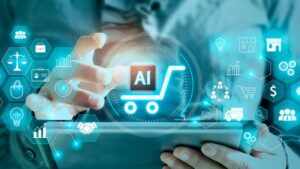AI marketing tools are built to streamline tasks and workflows for increased efficiency, helping businesses deliver targeted campaigns that generate higher return on investment (ROI). From content automation to email delivery, these AI-powered marketing solutions help streamline tasks while optimizing workflows for maximum efficiency.
Predictive generative AI solutions use machine learning techniques to automate customer segmentation by analyzing data patterns to produce targeted messaging for each audience segment. Others, like automated lead scoring and nurturing solutions, assist sales team processes by using AI to predict which leads are likely to convert into sales opportunities.
1. Automate Your Analytics
Establishing goals for AI automation and understanding how it fits into your marketing strategy are the first steps towards success. Doing this allows you to select tools that align with your objectives while prioritizing features and integration capabilities necessary. Consider providing training sessions so that all team members know how to use these tools properly and interpret insights they provide.
Once your AI tools have been setup, consider automating data analysis to save time and reduce errors. AI can be used for tasks like content scheduling, sentiment analysis and competitor pricing monitoring – freeing marketers up from repetitive tasks so they can focus on more strategic and creative marketing activities.
Another key advantage of AI is its ability to generate synthetic data that can be fed into machine learning models as training datasets, speeding up training time and eliminating inconsistent or inaccurate data sets from “garbage in, garbage out” problems. AI also plays an essential role in creating user-friendly dashboards or reports by producing interactive data visualizations with easy reading charts or graphs that can be read easily.
2. Automate Your Optimization
If you rely on manual methods to optimize individual web pages, AI could provide an upgrade. AI can automate technical SEO processes while offering scaleable personalization features to keep content engaging and relevant for visitors.
Keyword optimization, metadata enhancement and internal linking will all be handled automatically by a machine, freeing your team up to focus on more strategic development tasks. Furthermore, bulk content optimization for larger sites can also be automated to ensure consistent application and quality results.
Find AI tools that fit seamlessly with your current technology stack and offer clear documentation. Search for open APIs and pre-built connectors with minimal configuration required so as to avoid messy data siloes and ease integrations. Also prioritize ease of adoption and onboarding for teams, selecting tools that are user-friendly with no training needed, so as to accelerate getting up and running faster with AI solutions. McKinsey research indicates marketers utilizing AI experience revenue increases of 6–10% alongside cost savings (A Guide to Maximizing ROI with AI Automation | MetaSource). This provides real world value to businesses as it directly impacts both real world value as well as bottom lines.
3. Automate Your Reporting
AI-powered report automation enables marketers to produce more reliable and timely analyses of their data, with minimal human errors and increased accuracy when creating reports – essential factors when supporting strategic decision-making processes.
Consider all features and capabilities when choosing an AI reporting tool, including seamless data integration, natural language generation for narrative insights, predictive analytics capabilities and enterprise-grade security measures.
One risk associated with AI in reporting is its potential to reinforce or deepen existing biases. For example, when trained on data that includes racial or gender biases, AI systems could produce biased reports or make inaccurate recommendations inadvertently.
To avoid this pitfall, it is crucial that your data infrastructure undergoes an audit before implementing AI. Doing so can identify any inconsistencies or discrepancies that would render your AI analyses irrelevant, as well as designing standard report templates that your AI can generate automatically at scheduled intervals.
4. Automate Your Testing
AI can help reduce testing and optimizing time by automating routine tasks and increasing consistency. For instance, regression testing tools using AI can identify any bugs introduced by new code changes overnight – freeing QA engineers up to focus on more complex work while increasing accuracy and accelerating testing processes.
AI can also improve testing processes by employing predictive and path analysis to anticipate issues before they impact users. AI tools can scan an application for issues like user interface errors, form submission failures and inconsistencies across screen resolutions; additionally they can simulate user interactions to evaluate its functionality, usability and performance.
Implementing AI marketing automation requires setting clear objectives and selecting appropriate tools. Begin with pilot projects to understand their impact before expanding on what works. Once identified, scale up efforts gradually until benefits become evident – investing in tools with robust data collection processes which meet business goals is recommended.
5. Automate Your Optimization
AI can deliver extraordinary efficiency gains across a variety of operational domains, such as supply chain management, logistics optimization, manufacturing operations and maintenance. AI technology has demonstrated its worth in these areas by offering significant cost savings, reduced labor costs and faster execution (A Guide to Maximizing ROI Through Automation | MetaSource).
AI-driven content optimization solutions simplify the task of simultaneously optimizing large numbers of web pages while maintaining consistency and quality. Their intelligent algorithms examine a range of metrics to identify areas ripe for improvement and ensure that on-page SEO elements remain aligned with search intent and user engagement trends.
By automating tedious tasks, AI solutions free up human resources to focus on more pressing priorities – improving productivity and team morale simultaneously. Furthermore, as AI continues its rapid evolution, the functionality of these solutions also continues to advance; providing businesses with an adaptive, scalable, and flexible solution for digital marketing challenges of today and tomorrow.




